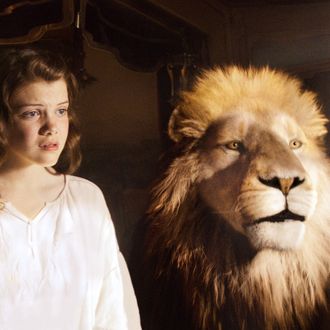
Kenneth Lonergan, the writer-director behind Sundance breakout and likely award-contender Manchester By the Sea, has some thoughts on, of all things, the Chronicles of Narnia films that he would really, really like to share. In a recent BAFTA Screenwriters’ Lecture (via The Playlist), Lonergan swerved into an extensive — really, there’s no better way to put this — read of the entire Narnia film series, which he sees as an example of American film’s fetishization of personal growth. See, Lonergan is to personal growth as Sam I Am is to green eggs and ham: not on a boat, not on a train, and certainly not in studio franchises.
One of my other pet peeves is this. This has been going on for 30 years now, but the personal growth required for every major American film from a studio just makes you want to kill yourself. It might have been tolerable when it was a soap opera drama, but now it’s infected all these genres where it doesn’t belong — science fiction movies, fantasy movies. Captain America has to have a moment of personal growth or it’s no good. I don’t know where they get the idea that anybody wants to see this but they cannot shake it. It’s incredible. I want to see Captain America throw his shield and hit people, and maybe get in trouble and get out of it somehow. I’m not interested in his emotional progression. And I don’t think anybody is. But they keep putting it on and on and on. One of my favourite examples of this is — did any of you see those Narnia movies they made, The Lion, the Witch and the Wardrobe? Do you know the books, all of you?
Of course you do. Well, I love those books and I detest those movies. Actually The Voyage of the Dawn Treader was ok, but the other two … There’s a moment in The Lion, the Witch and the Wardrobe, the film, and I don’t like to be publicly critical of other people’s work because I’m not a critic, but this is too much to bear.
Susan and Peter are on an ice flow in a frozen river that’s breaking up. Chunks of ice are going downstream and going over the edge of a waterfall, and on both banks of the river they’re surrounded by wolves — enormous, CGI, double-sized wolves — snarling at them, going to tear them to pieces. And Peter’s got a sword that he was given by Santa Claus, I guess, Father Christmas. It really looks like it’s curtains. He’s standing there and Susan says to him, ‘Just because someone gives you a sword doesn’t make you a hero, Peter’. And I thought, ‘You can’t be serious? This is not the time for that kind of discussion.’ In fact, it never is.
Why that’s there I don’t know, because nobody wants to see it, nobody wants to write it. I know it’s there because, ‘we really want to see Susan and Peter’s growth in this process, we don’t want to just have a bunch of swords and wolves, who wants to see that?’ Well, I do. And also in the books they have perfectly good relationships. When I saw Prince Caspian I knew before I went in there. In the book, I don’t know how well you remember this — I remember it very well — but Prince Caspian and Peter get along just fine right away. Peter’s the high king from the olden days, as far as Caspian’s concerned, and the first scene they have in the book Peter says, ‘I’m not here to replace you, I’m here to help you’. They get along just fine from that point on. And I knew, I knew when I saw the movie there would be a real struggle between Caspian and Peter, really going at it and then getting together. And sure enough, there they are, cursing and yelling at each other, sneering at each other. Who’s going to be the king and so on. You can see it coming a mile away. I don’t know who they’re doing it for. It’s appalling.
First, this might give you some insight into all the battles behind the mystifying Margaret, which took so long to make it to the screen. Second, our only quibble is that Lonergan missed the chance to include some devastating puns: Voyage of the Yawn Trader, Prince Has-Bian, The Lion, the Witch, and the Ward-Nope, etc. Oh no, please don’t tell us if he hates puns, too.


